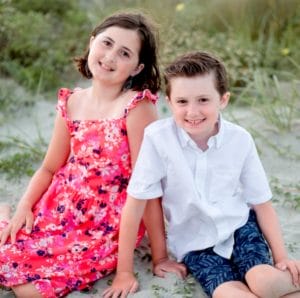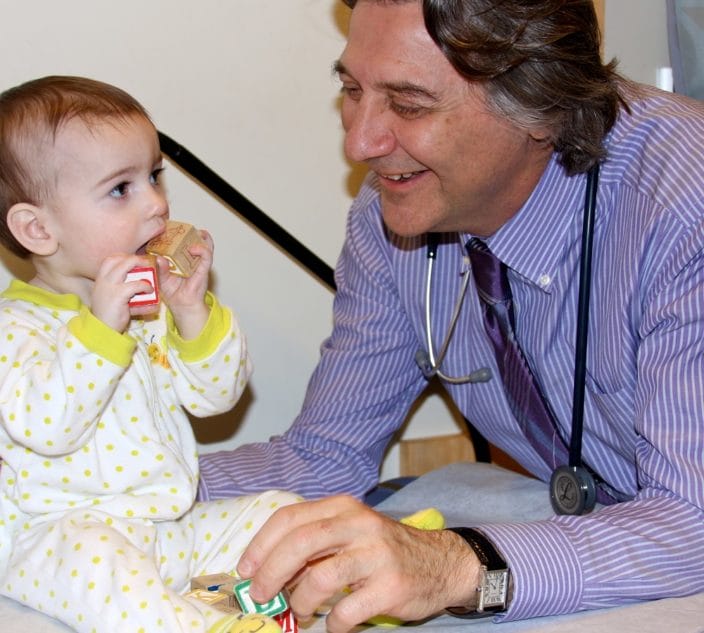
Until it was recalled in February 2022, EleCare Jr Unflavored formula provided about 90 percent of 9-year-old Evan’s nutrition. Since then, the boy has experienced hives, eczema, flushing and vomiting while trying out various other amino acid-based formulas.
Even the one formula that he is tolerating is causing throat-clearing for Evan, who has multiple food allergies and eosinophilic disorders, and uses a gastrostomy tube (G-Tube), says his mom Melissa [last name withheld for privacy].
Abbott Nutrition’s recall of Elecare Jr has led to huge demand for the brand’s few hypoallergenic formula competitors. That has also affected Evan’s 12-year-old sister Amira, who has multiple food allergies and eosinophilic disorders. She relies on Neocate Splash and Neocate Junior for most of her nutrition, which is suddenly also in short supply.
“It’s been an extremely stressful time for our family, trying to figure out how to get our kids adequate nutrition,” says Melissa of Draper, Utah.
On February 17, Abbott Nutrition voluntarily recalled certain lots of powdered formulas, including EleCare, Similac, and Alimentum that were manufactured at the company’s Sturgis, Michigan facility. The FDA is investigating a few consumer complaints about Cronobacter illness in children who had consumed powdered formula made at that plant. A case of Salmonella Newport infection in an infant who had consumed formula from the Sturgis facility was also reported at the time of the recall, but the FDA determined that there was insufficient information to link that case to that facility. The FDA’s website includes more information about the recall and FDA investigation.
The shortage of these hypoallergenic amino acid-based formulas has sent many families like Melissa’s scrambling to find safe alternatives for their children. It has been especially challenging for patients with food allergies, Food Protein-Induced Enterocolitis Syndrome (FPIES), or eosinophilic disorders, such as eosinophilic esophagitis (EoE), a form of food allergy where certain foods trigger damaging inflammation in the esophagus.
Many of the standard formulas are made from cow’s milk or soy, which are top allergens and common triggers for EoE, notes Alison Cassin, a registered dietitian at Cincinnati Children’s Hospital. That is why the amino acid-based formulas are so important for families navigating food allergies or eosinophilic disorders. She says they provide complete nutrition, including necessary fats, proteins and vitamins, without the common allergens.
Supply Chain Shortage
Cassin and her colleagues at Cincinnati Children’s have been fielding five to 10 calls a day about formulas since the February recall. Initially, they were helping families find alternatives to EleCare, but that snowballed to dealing with widespread formula shortages, she says. The supply issues continue to upend the medical team’s progress as they will find an available safe alternative for a family, only to start the process again when the replacement formula is then out of stock a week later.
Cassin says that a lot of kids get used to the flavor and mouth feel of a formula, so it can be difficult to find an option that works for a patient, even if it is safe. “It’s one thing they can rely on that’s safe – it’s a comfort,” she says.
Without the recalled EleCare Jr, options for patients requiring amino acid-based formulas include:
– Nutricia’s Neocate Splash (ready to feed) and Neocate Junior (powdered);
– Enfamil’s PurAmino (powdered);
– Nestle’s Alfamino (powdered);
– and Cambrooke’s EquaCare Jr. (powder) and Essential Care Jr. (powder).
Now the increased demand has exhausted the available supply of many of those products. Neocate, which Cassin says is a popular choice as an alternative because it has many flavor options, is currently hard to come by.
Ramping Up Production
Nutricia, which manufactures Neocate, outlined its strategies “to address the skyrocketing demand for Neocate products” in an April 8 statement. The company has ramped up supply. It is now making three times more Neocate DHA/ARA Infant formula than before the Abbott recall, and has significantly increased the production of Neocate Junior Unflavored, said Steven Yannicelli, Nutricia North America’s vice president of medical and scientific affairs.
In its statement, Nutricia says: “We have continued to produce and ship product, however the significant increase in demand has continued to outpace our production since the Abbott recall, which is why we are experiencing challenges keeping product in stock and available.”
As new inventory is being added to the supply chain, Nutricia says it expects “availability will remain tight for the next couple of months.”
Abbott Nutrition’s efforts to address the supply issues include: increasing production at other facilities of their formulas, including speciality products for those who can’t tolerate standard formulas; shipping products from FDA-registered facilities in Europe; and contacting manufacturers of other formula brands about supply constraints, according to an Abbott spokesperson.
“We know that millions of parents and caregivers around the world count on our formulas to feed their babies and children and we are doing everything possible to address this situation,” said an Abbott spokesperson.
How to Cope
While manufacturing companies work to increase formula supply, families who rely on hypoallergenic formula could be searching for solutions for a few months. But Cassin advises:
“Don’t lose heart. I am hopeful this will turn a corner soon.”

In the meantime, she is working with families to find creative ways to piece together her patients’ dietary needs. For example, adding vitamin and mineral supplements or making smoothies, and going back to their allergy list to see if some of the new plant-based products on the market could be an option. Cassin tells families that it’s OK if the solutions for getting calories to replace formula are not the most nutritious during the short term.
One can of powdered formula, which provides about 2,000 calories, can last a couple of days in younger kids, Cassin says. But a teen with EoE can use as much as 1 1/2 cans per day, so finding enough formula has been especially challenging, she says.
Evan goes through one can of formula per day, as he is not getting many calories from his few safe foods, such as blueberries. When his go-to formula was recalled, his mom spent hours a day searching for non-recalled lots of the formula to try to stretch his supply as long as possible, knowing from past experience that he would have a tough time tolerating other brands. She reached out to Abbott Nutrition, formula exchanges, social media groups, sales representatives, and physicians’ offices to try to find non-recalled cans of EleCare while she is seeking a long-term solution.
The eosinophilic disorders community is doing a good job of sharing what formula they can during this crisis, says Melissa, who runs a local support group. She has helped match up families who need formula with those who have a surplus, and sent some extra Neocate Splash from her daughter’s supply that would expire soon to other families who didn’t get their delivery.
“It is a pretty awful feeling as a parent when you can’t provide a basic need for your child,” Melissa says. “We will all be happy when formula insecurity is behind us.”
Related Reading:
Dupilumab Shows Success in EoE, Leading to Hopes for Approval
Some Adults with EoE Allergy Can Just Cut Milk, Instead of 6 Foods
A Blood Test to Diagnose EoE Triggers? Researchers Make Progress





